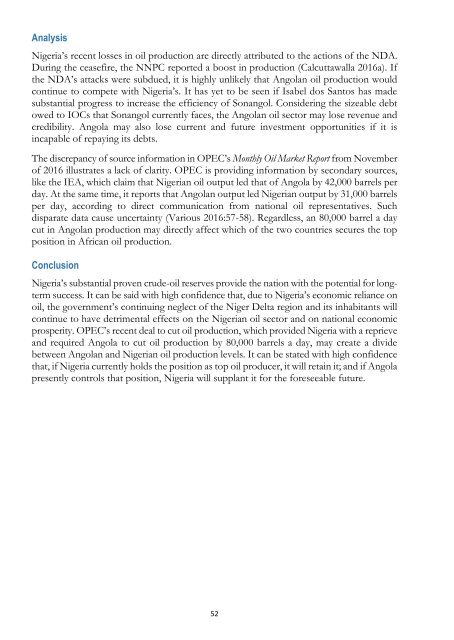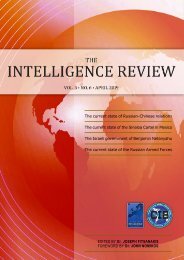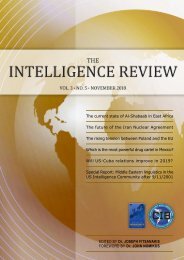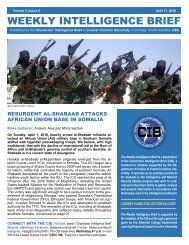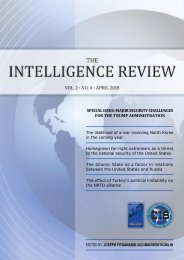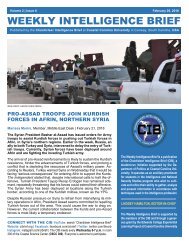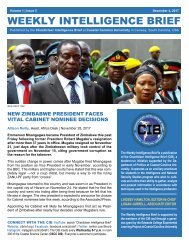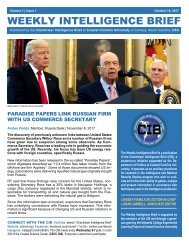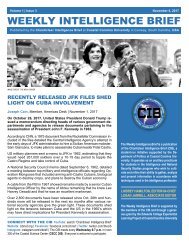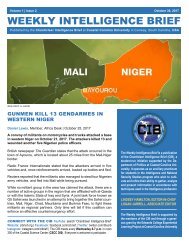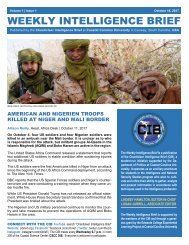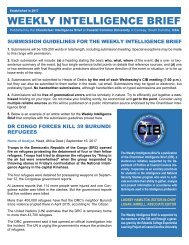The Intelligence Review | volume 1 | issue 2 |
This volume is the product of a collaboration between the European Intelligence Academy (EIA) and the Chanticleer Intelligence Brief (CIB), a student-run initiative supported by the Department of Politics at Coastal Carolina University in Conway, South Carolina, United States. Eleven CIB analysts tackle some of the most pressing and timely questions confronting intelligence observers today. Topics include the gun control debate in the United States, Russia’s involvement in the Syrian Civil War, the future of Kurdish nationalism, and the internal Palestinian dispute between Hamas and Fatah. Papers in this volume also examine the current state of Islamist extremism, and extrapolate on its future prospects in the Middle East, West Africa, the Lake Chad region, as well as in Southeast and Central Asia. CIB analysts propose carefully crafted and informed forecasts that outline future developments in some of the world's most unpredictable hot spots.
This volume is the product of a collaboration between the European Intelligence Academy (EIA) and the Chanticleer Intelligence Brief (CIB), a student-run initiative supported by the Department of Politics at Coastal Carolina University in Conway, South Carolina, United States. Eleven CIB analysts tackle some of the most pressing and timely questions confronting intelligence observers today. Topics include the gun control debate in the United States, Russia’s involvement in the Syrian Civil War, the future of Kurdish nationalism, and the internal Palestinian dispute between Hamas and Fatah. Papers in this volume also examine the current state of Islamist extremism, and extrapolate on its future prospects in the Middle East, West Africa, the Lake Chad region, as well as in Southeast and Central Asia. CIB analysts propose carefully crafted and informed forecasts that outline future developments in some of the world's most unpredictable hot spots.
- No tags were found...
Create successful ePaper yourself
Turn your PDF publications into a flip-book with our unique Google optimized e-Paper software.
Analysis<br />
Nigeria’s recent losses in oil production are directly attributed to the actions of the NDA.<br />
During the ceasefire, the NNPC reported a boost in production (Calcuttawalla 2016a). If<br />
the NDA’s attacks were subdued, it is highly unlikely that Angolan oil production would<br />
continue to compete with Nigeria’s. It has yet to be seen if Isabel dos Santos has made<br />
substantial progress to increase the efficiency of Sonangol. Considering the sizeable debt<br />
owed to IOCs that Sonangol currently faces, the Angolan oil sector may lose revenue and<br />
credibility. Angola may also lose current and future investment opportunities if it is<br />
incapable of repaying its debts.<br />
<strong>The</strong> discrepancy of source information in OPEC’s Monthly Oil Market Report from November<br />
of 2016 illustrates a lack of clarity. OPEC is providing information by secondary sources,<br />
like the IEA, which claim that Nigerian oil output led that of Angola by 42,000 barrels per<br />
day. At the same time, it reports that Angolan output led Nigerian output by 31,000 barrels<br />
per day, according to direct communication from national oil representatives. Such<br />
disparate data cause uncertainty (Various 2016:57-58). Regardless, an 80,000 barrel a day<br />
cut in Angolan production may directly affect which of the two countries secures the top<br />
position in African oil production.<br />
Conclusion<br />
Nigeria’s substantial proven crude-oil reserves provide the nation with the potential for longterm<br />
success. It can be said with high confidence that, due to Nigeria’s economic reliance on<br />
oil, the government’s continuing neglect of the Niger Delta region and its inhabitants will<br />
continue to have detrimental effects on the Nigerian oil sector and on national economic<br />
prosperity. OPEC’s recent deal to cut oil production, which provided Nigeria with a reprieve<br />
and required Angola to cut oil production by 80,000 barrels a day, may create a divide<br />
between Angolan and Nigerian oil production levels. It can be stated with high confidence<br />
that, if Nigeria currently holds the position as top oil producer, it will retain it; and if Angola<br />
presently controls that position, Nigeria will supplant it for the foreseeable future.<br />
52


